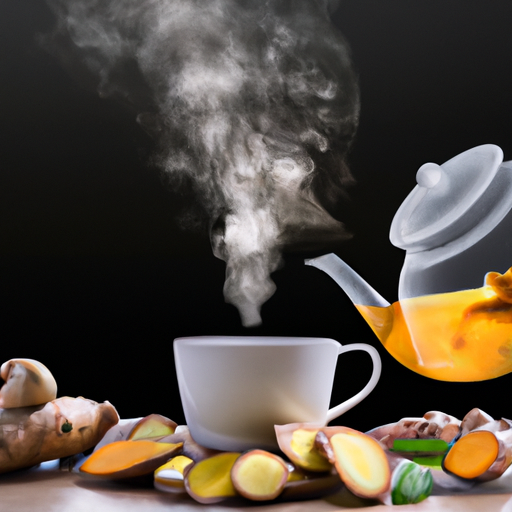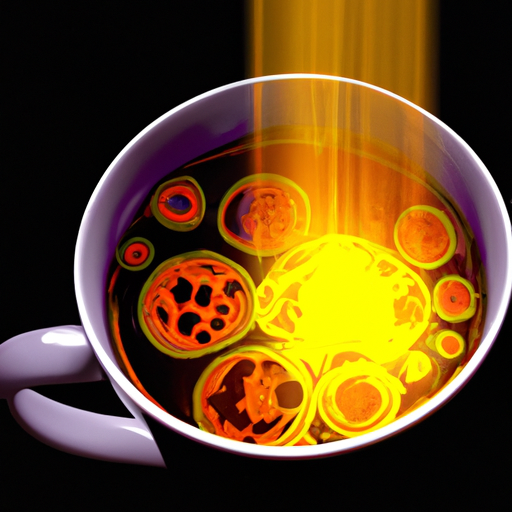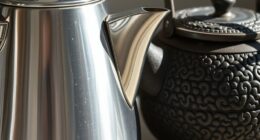I really enjoy beginning my day with a warm mug of ginger and turmeric tea. It’s not only tasty, but it also offers many health benefits that leave me feeling energized and prepared to tackle the day ahead.
But, like with any food or drink, it’s important to know the recommended daily intake to ensure we are not overdoing it and causing any potential harm to our bodies.
In this article, we will explore the health benefits of ginger and turmeric tea, the recommended daily intake, how to prepare the tea, potential side effects, and precautions to take.
Additionally, we will provide some delicious recipes to switch up your tea routine, and discuss other uses of ginger and turmeric.
So, let’s dive in and learn all about the wonders of ginger and turmeric tea!
Key Takeaways
- Recommended dosage for ginger and turmeric tea is 1-2 teaspoons of fresh grated ginger and/or turmeric per cup of hot water.
- Factors such as age, weight, and health status affect recommended daily intake, so consult with healthcare provider before starting a new regimen.
- Excessive consumption of ginger and turmeric tea may have adverse effects, and maximum safe intake of ginger and turmeric are 4 grams and 3 grams per day, respectively.
- Preparation and consumption of ginger and turmeric tea should be carefully monitored, and any symptoms or concerns should be discussed with a healthcare professional.
Health Benefits of Ginger and Turmeric Tea
Looking to improve your health? Sip on a warm cup of ginger and turmeric tea, known for its numerous health benefits.
Ginger and turmeric are both well-known for their anti-inflammatory properties, which can help reduce inflammation in the body. This inflammation reduction can help with a variety of health issues, including arthritis, heart disease, and even certain types of cancer.
Additionally, ginger and turmeric tea can aid in digestion and help alleviate nausea and vomiting.
When it comes to the dosage recommendations for ginger and turmeric tea, it’s important to note that there’s no one-size-fits-all answer. The optimal dosage can vary depending on factors such as age, weight, and health status. It’s generally recommended to start with a small amount of ginger and turmeric and gradually increase the dosage as tolerated.
As with any herbal supplement, it’s always best to consult with a healthcare provider before starting a new regimen.
Now let’s dive into the recommended daily intake of ginger and turmeric tea.
Recommended Daily Intake
When it comes to daily intake of ginger and turmeric tea, there are several factors that can affect how much you should consume. These factors include your age, weight, and overall health. However, there are general guidelines for daily intake that can help you reap the health benefits of these powerful herbs.
It’s important to note that there is also a maximum safe intake for both ginger and turmeric, so it’s important to be mindful of how much you’re consuming each day.
Factors that Affect Daily Intake
Did you know that factors like age, weight, and health conditions can all affect how much ginger and turmeric tea you should consume daily? These factors can impact the absorption of the active compounds in ginger and turmeric, affecting their effectiveness in the body.
For example, older adults may need higher doses due to decreased absorption, while those with liver or kidney disease should limit their intake due to potential interactions with medication. Additionally, recommended doses for different health conditions can vary.
For example, those with arthritis may benefit from higher doses of ginger and turmeric, while those with digestive issues may need to start with smaller amounts to avoid exacerbating symptoms. It’s important to consult with a healthcare provider to determine the appropriate dosage for your specific needs.
With these factors in mind, it’s important to follow general guidelines for daily intake to ensure safe and effective use of ginger and turmeric tea.
General Guidelines for Daily Intake
To ensure safe and effective use of ginger and turmeric, you should follow general guidelines for daily intake based on your age, weight, and health conditions. Consuming too much of these spices may have adverse effects, while taking too little may not provide the intended benefits. The recommended dosage for ginger and turmeric tea is typically 1-2 teaspoons of fresh grated ginger and/or turmeric per cup of hot water. It’s important to note that dried forms of ginger and turmeric are more concentrated, so the recommended dosage would be less.
Benefits and risks should also be taken into consideration when determining the appropriate daily intake of ginger and turmeric tea. These spices have been found to have anti-inflammatory and antioxidant properties, which can help reduce the risk of chronic diseases. However, excessive consumption may lead to digestive issues, such as heartburn and nausea. It’s best to consult with a healthcare professional before incorporating ginger and turmeric tea into your daily routine, especially if you have any pre-existing health conditions.
Moving forward to the subsequent section about maximum safe intake, it’s important to note that exceeding the recommended dosage of ginger and turmeric tea may lead to adverse effects. Therefore, it’s crucial to monitor the amount of tea consumed and to consult with a healthcare professional if any concerns arise.
Maximum Safe Intake
It’s crucial to monitor your intake of ginger and turmeric to avoid adverse effects, as exceeding the recommended dosage may pose potential risks. While both spices are generally safe for consumption, it’s important to be aware of the maximum safe intake to prevent any negative effects on your health. Here are some points to keep in mind:
-
According to the World Health Organization (WHO), the maximum safe intake of ginger is 4 grams per day, while the maximum safe intake of turmeric is 3 grams per day.
-
Excessive consumption of ginger may cause gastrointestinal problems, such as heartburn, diarrhea, and stomach upset.
-
Overconsumption of turmeric may lead to liver damage and interfere with the body’s ability to absorb iron.
-
It’s important to note that these guidelines are for dietary supplements, and the recommended dosage for culinary use may be different.
Keeping these guidelines in mind will help you enjoy the benefits of ginger and turmeric without putting your health at risk.
Now, let’s move on to how to prepare ginger and turmeric tea.
How to Prepare Ginger and Turmeric Tea
First, I like to grate fresh ginger and turmeric to make my tea. I find that it gives me a richer flavor and more health benefits. To prepare the tea, I simply steep the grated ginger and turmeric in hot water for a few minutes and then strain the mixture.
I like to experiment with different variations, such as adding honey, lemon, or cinnamon, depending on my mood and taste preferences. There are many serving suggestions for ginger and turmeric tea. Some people prefer to drink it in the morning to kickstart their day, while others enjoy it as a cozy nighttime ritual.
You can also enjoy it over ice for a refreshing summer drink. Just keep in mind that the recommended daily intake of ginger and turmeric is about 1-2 teaspoons each. As with any new addition to your diet, it’s always best to start with a small amount and gradually increase if you feel comfortable.
Now, let’s move on to the potential side effects of drinking ginger and turmeric tea.
Potential Side Effects
As I’m exploring the benefits of ginger and turmeric tea, it’s important to also consider potential side effects. Some people may experience an upset stomach after consuming large amounts of ginger or turmeric.
Additionally, these spices may interfere with certain medications, so it’s important to consult with a healthcare professional before adding them to your diet.
Lastly, some individuals may have allergic reactions to ginger or turmeric, so it’s important to monitor any symptoms and seek medical attention if necessary.
Upset Stomach
Feeling queasy? Try drinking a cup of ginger and turmeric tea, which can help relieve your upset stomach. Ginger and turmeric tea benefits digestion by promoting the production of digestive juices, reducing inflammation in the gut, and stimulating muscle contractions in the digestive tract.
To use ginger and turmeric tea for stomach discomfort, simply steep a teaspoon of grated ginger and a teaspoon of grated turmeric in hot water for about 10 minutes. Strain and enjoy the tea while it’s still warm. However, it’s important to note that excessive consumption of ginger and turmeric tea can actually worsen stomach problems such as acid reflux or ulcers.
Additionally, some people may experience an upset stomach or diarrhea as a side effect of consuming ginger and turmeric in large amounts. As with any natural remedy, it’s best to start with a small amount and gradually increase the dosage as tolerated.
In the next section, we’ll explore how ginger and turmeric tea can interfere with certain medications.
Interference with Medications
Using natural remedies like ginger and turmeric tea can have potential risks when combined with certain medications, making it important to be mindful of possible interference. Drug interactions can occur when taking these teas alongside prescription drugs, over-the-counter medications, and supplements.
For example, ginger may interfere with blood-thinning medications, such as warfarin, and increase the risk of bleeding. On the other hand, turmeric may interact with medications that affect blood sugar levels, such as diabetes medications, and lead to hypoglycemia.
It’s important to talk to a healthcare professional before taking ginger and turmeric tea, especially if you’re taking medications or have a chronic medical condition. Your doctor may recommend dosage adjustments or advise you to avoid using the tea altogether to prevent potential health risks. By being aware of these drug interactions, you can ensure safe and effective use of natural remedies to support your health and well-being.
Allergic reactions to ginger and turmeric tea are another potential risk to be mindful of, which will be discussed in the subsequent section.
Allergic Reactions
To be mindful of potential allergic reactions, it’s important for you to know the symptoms that may arise after consuming ginger and turmeric tea, such as hives, itching, and difficulty breathing. Allergic reactions to ginger and turmeric are rare, but they can occur. If you experience any of these symptoms, it’s essential to stop drinking the tea and seek medical attention immediately.
Additionally, it’s crucial to adhere to the recommended daily intake limits for ginger and turmeric tea. Consuming too much of these herbs can cause adverse effects, such as stomach upset, dizziness, and diarrhea. It’s recommended to limit your daily intake to no more than two cups of ginger and turmeric tea per day.
By being aware of potential allergic reactions and adhering to daily intake limits, you can safely enjoy the health benefits of ginger and turmeric tea.
Moving onto the next section about precautions, it’s important to note that while ginger and turmeric tea has many health benefits, it may interact with certain medications.
Precautions
It’s important to be aware of precautions when consuming ginger and turmeric tea on a daily basis. While these ingredients have numerous health benefits, they can also interact with certain medications and cause adverse effects.
Here are a few precautions to keep in mind:
-
Consult with your healthcare provider before starting to drink ginger and turmeric tea if you’re pregnant, breastfeeding, or have a medical condition.
-
Avoid consuming large amounts of ginger and turmeric tea if you’re taking blood-thinning medications, as they can increase the risk of bleeding.
It’s also important to note that ginger and turmeric tea may cause mild side effects, such as stomach upset, diarrhea, or skin irritation, especially if consumed in large amounts. However, these side effects are usually temporary and can be minimized by drinking the tea in moderation.
By being mindful of these precautions, you can safely enjoy the many benefits of ginger and turmeric tea.
Moving on to the next section, let’s explore some delicious ginger and turmeric tea recipes that you can easily make at home.
Ginger and Turmeric Tea Recipes
I love experimenting with different recipes for ginger and turmeric tea! My go-to recipe is a basic one with just ginger, turmeric, and honey, but sometimes I like to switch it up.
One of my favorite variations is a ginger and turmeric latte, which adds a creamy and comforting element to the tea.
During the summer months, I enjoy making iced ginger and turmeric tea for a refreshing and healthy drink option.
Let’s explore these recipes together and see which one becomes your new favorite!
Basic Ginger and Turmeric Tea
Hey, if you’re feeling under the weather, try sipping on a cup of basic ginger and turmeric tea – it’ll give you a little boost! This tea is not only delicious, but it also has amazing health benefits.
Ginger and turmeric tea variations are endless, but for starters, here’s a simple recipe to get you started:
- Boil 2 cups of water in a small pot
- Peel and grate a 1-inch piece of fresh ginger and add it to the pot
- Add 1 teaspoon of ground turmeric powder
- Reduce the heat and let it simmer for 10-15 minutes
- Strain the tea and add honey or lemon to taste
Drinking this tea regularly can help with digestion, reduce inflammation, and boost your immune system. Additionally, the benefits of ginger and turmeric tea for skin are not to be ignored. Both ingredients contain antioxidants and anti-inflammatory compounds that can help improve skin tone and reduce acne.
Now, if you want to take your ginger and turmeric game to the next level, try making a ginger and turmeric latte. It’s a creamy and comforting drink that’s perfect for chilly days.
Ginger and Turmeric Latte
To take your ginger and turmeric game to the next level, why not try whipping up a creamy and comforting ginger and turmeric latte? Not only is it a delicious way to consume these two superfoods, but it also adds some variety to your daily routine. Ginger and turmeric latte is a popular drink that is not only tasty but also provides several health benefits.
Some of the benefits of consuming ginger and turmeric latte include reducing inflammation, boosting immune function, aiding digestion, and improving brain function. You can also experiment with different variations of ginger and turmeric latte, such as adding honey or coconut milk to make it even more delicious. So, why not give it a try and see how it can improve your health and well-being?
Moving on to the next topic, let’s explore how to make iced ginger and turmeric tea.
Iced Ginger and Turmeric Tea
Cool off with a refreshing blend of zesty ginger and earthy turmeric in this icy beverage. Iced ginger and turmeric tea is a perfect summer drink that not only quenches your thirst but also provides various health benefits.
Here are three reasons why you should try this iced tea:
- Ginger and turmeric have anti-inflammatory properties that can help reduce inflammation in the body.
- Drinking ginger and turmeric tea can help improve digestion and relieve bloating.
- Turmeric is known for its antioxidant properties, which can help protect the body against damage caused by free radicals.
Apart from being a delicious and healthy beverage, iced ginger and turmeric tea can also serve as a base for other refreshing drinks.
In the next section, we’ll explore the various other uses of ginger and turmeric.
Other Uses of Ginger and Turmeric
Ginger and turmeric have been used for centuries in traditional medicine, and incorporating them into your daily routine can provide numerous health benefits. Apart from their uses in cooking, both ginger and turmeric have potential skin benefits. Ginger has anti-inflammatory properties that can help reduce redness and irritation, while turmeric contains curcumin, which has been shown to improve skin elasticity and reduce the appearance of fine lines and wrinkles.
In addition to their potential skin benefits, ginger and turmeric have also been used to alleviate digestive issues and reduce inflammation. They can be added to smoothies, soups, and stir-fries to give them a flavorful kick and provide added health benefits.
With so many ways to incorporate ginger and turmeric into your daily routine, it’s easy to see why they have become popular in recent years. However, if you’re looking for a convenient and tasty way to enjoy these powerful ingredients, you may want to consider trying some of the many ginger and turmeric tea products available on the market today.
Ginger and Turmeric Tea Products
I’ve been experimenting with different ways to consume ginger and turmeric, and one of my favorite methods is through tea.
There are several different products available for making ginger and turmeric tea, including tea bags, loose tea, and powdered mixes. Each option has its own benefits and drawbacks, so it’s important to choose the best one for your needs and preferences.
In this discussion, I’ll explore the pros and cons of each type of ginger and turmeric tea product.
Tea Bags
You can easily brew a delicious cup of ginger and turmeric tea using tea bags. When choosing tea bags, it is important to consider the quality of the product. Look for tea bags made from unbleached and organic materials to ensure that harmful chemicals are not present in your tea. Additionally, pay attention to the brewing time to achieve the perfect flavor and aroma. For ginger and turmeric tea, it is recommended to steep the tea bag in hot water for 5 to 7 minutes. This will allow the flavors and health benefits of the ginger and turmeric to infuse into the water.
To help you choose the best tea bags for your ginger and turmeric tea, here is a table comparing some popular options:
| Tea Bag Brand | Quality | Brewing Time | Price per Bag |
|---|---|---|---|
| Yogi | Organic, unbleached | 5-7 minutes | $0.27 |
| Traditional Medicinals | Organic, unbleached | 7-10 minutes | $0.25 |
| Bigelow | Not organic, bleached | 3-5 minutes | $0.10 |
| Celestial Seasonings | Not organic, bleached | 5-7 minutes | $0.14 |
As you can see from the table, there are significant differences in tea bag quality and price. When choosing the best tea bags for your ginger and turmeric tea, it is important to consider both factors. However, if you prefer a more personalized tea experience, you may want to try loose tea instead.
Loose Tea
Previously, we discussed the benefits of using tea bags to make ginger and turmeric tea. However, there are other tea types available that can be used to make this delicious and healthy drink. Loose tea is one such option that provides a more authentic tea experience.
Loose tea is made up of whole tea leaves and can be brewed in a variety of ways to suit individual preferences. When it comes to brewing loose tea, there are a few methods to choose from. One popular method is using a tea infuser or strainer to steep the leaves in hot water. This allows for a more customized tea experience, as the amount of tea and brewing time can be adjusted to suit individual tastes.
Another method is the traditional Chinese method of brewing tea, which involves rinsing the tea leaves with hot water before steeping them for a short amount of time. This method is said to enhance the flavor and aroma of the tea.
Moving on to the next section, powdered mixes are another option for making ginger and turmeric tea. With the convenience of pre-measured portions and the ability to mix into cold or hot liquids, powdered mixes can be a quick and easy way to enjoy the health benefits of ginger and turmeric.
Powdered Mixes
If you’re looking for a quick and easy way to enjoy the health benefits of ginger and turmeric, powdered mixes can be a great option. These mixes typically come in sachets or canisters and can be easily mixed with hot water to create a flavorful and nutritious tea. The convenience of powdered mixes makes them a popular choice for those who are always on the go and don’t have time to prepare loose tea.
However, it’s important to note that some powdered mixes may contain added sugars or artificial sweeteners, which can negate the health benefits of ginger and turmeric. Additionally, consuming excessive amounts of these spices can lead to health risks such as stomach upset, heartburn, and nausea. As with any food or supplement, it’s important to consume ginger and turmeric in moderation and consult with a healthcare professional if you have any concerns.
Moving on to the next section, if you’re wondering where to buy ginger and turmeric tea, there are many options available both online and in stores.
Where to Buy Ginger and Turmeric Tea
Looking for a place to purchase ginger and turmeric tea? Check out your local health food store or online retailers. These types of stores usually carry a variety of tea blends that include ginger and turmeric, which can be purchased in loose leaf form or in tea bags. When buying from health food stores, it’s important to read the label carefully to ensure that the tea blend doesn’t contain any harmful additives or chemicals.
In terms of benefits and risks, ginger and turmeric tea blends have been shown to have anti-inflammatory properties that can improve digestion and reduce pain and swelling. However, it’s important to note that excessive consumption of ginger and turmeric can cause side effects such as heartburn, nausea, and diarrhea. Additionally, when compared to other tea blends, ginger and turmeric tea may have a stronger taste and aroma that some people may not enjoy.
Overall, ginger and turmeric tea can be a healthy and flavorful addition to your daily routine, but it’s important to consume it in moderation and consult with a healthcare professional if you have any concerns.
Frequently Asked Questions
Can ginger and turmeric tea help with weight loss?
Ginger and turmeric tea for weight loss is a popular trend, but the benefits of ginger and turmeric tea for digestion are scientifically proven. Evidence suggests it aids in weight loss by reducing inflammation and increasing metabolism.
Is it safe to consume ginger and turmeric tea during pregnancy?
As a healthcare provider, I recommend avoiding ginger and turmeric tea during pregnancy. While they have potential health benefits, consuming them while pregnant may pose risks such as miscarriage, premature birth, and fetal distress.
Can ginger and turmeric tea interact with certain medications?
Drug interactions are possible with ginger and turmeric tea. Consult with a healthcare provider before consuming if taking medication. Dosage recommendations vary, but moderation is key. Always prioritize safety over potential benefits.
Does adding honey or lemon to ginger and turmeric tea affect its health benefits?
Adding honey or lemon to ginger and turmeric tea can enhance its health benefits. Honey has antibacterial properties and lemon adds vitamin C. The best time to drink the tea is in the morning or after meals.
Is it better to consume ginger and turmeric tea hot or cold?
Based on research, consuming ginger and turmeric tea hot may provide more benefits due to increased absorption of the active compounds. However, it can be enjoyed cold as well. The best time to consume it is before or after meals.
Conclusion
In conclusion, incorporating ginger and turmeric tea into your daily routine can offer many health benefits, including reducing inflammation, aiding digestion, and boosting immunity. However, it’s important to consume this tea in moderation and follow the recommended daily intake guidelines to avoid potential side effects.
As the adage goes, "everything in moderation."While ginger and turmeric tea can offer numerous health benefits, it’s important to remember that too much of a good thing can have negative consequences. By enjoying this tea in moderation and following proper precautions, you can reap the benefits of these powerful spices and improve your overall health and well-being.
So, brew a cup of ginger and turmeric tea and sip your way to a healthier you.










